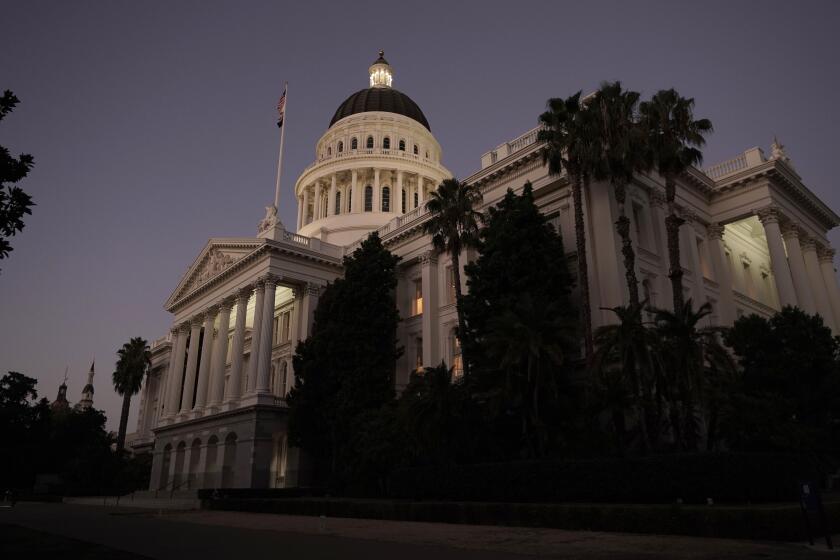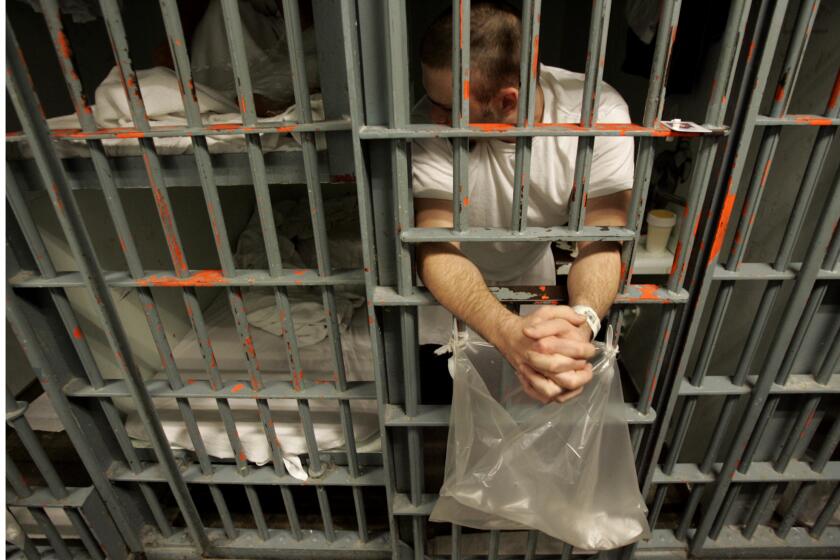Newsom signs legislative crime package addressing organized retail theft

- Share via
SAN JOSÉ — Gov. Gavin Newsom has signed 10 bills in what he is calling an unprecedented effort to combat escalating retail crimes, car thefts and the sale of stolen goods, enacting stricter penalties for repeat offenders and enhanced tools for felony prosecutions.
“These bills will strengthen existing laws. They’ll enhance other laws, and they will address the challenges that are well outside the purview of previous initiatives and laws,” Newsom said at a news conference Friday morning inside a Home Depot in San José. “That’s the issue of organized retail theft, the issue of serial theft, the issue that is front and center in the consciousness of so many Californians.”
Newsom’s action comes eight months after he called on legislators to address rising retail thefts across the state, particularly early in the COVID-19 pandemic, when major California cities saw the most dramatic increase in property crimes. It also comes at a divisive moment for Democrats in the Golden State, who are at odds over how to respond to the public concern about brazen thefts.
Some members of the Black caucus opposed the legislation, saying it would lead to too many people being sent to prison.
California lawmakers passed these bills to address crime:
AB 2943 allows felony charges on the third theft offense, aggregates dollar amounts and expands drug diversion programs.
AB 3209 allows a court to impose a restraining order for up to two years against a person who has stolen, vandalized or committed battery against an employee. It would also require the court to consider whether a person lives in a “food desert” and whether the store is the only location for necessities.
AB 1779 allows prosecutors to charge several offenses that took place across counties and handle them in a single court.
AB 1802 makes permanent the California Highway Patrol property crimes task force.
AB 1972 expands the California Highway Patrol’s property crimes task force program to include cargo theft and railroad police.
SB 905 creates two new “wobbler” offenses that can be charged as felonies or misdemeanors: breaking into a car with the intent to steal, and possessing property stolen from a car worth at least $950 with the intent to sell it.
SB 1242 gives a stiffer sentence to people convicted of setting a fire on a retailer’s property to commit organized theft.
SB 1416 creates a sentencing enhancement for selling, exchanging or returning for value an item acquired through shoplifting, burglary or theft.
SB 1144 requires online marketplaces to collect information from high-volume third-party sellers and grants authority to district attorneys to bring civil actions to enforce violations.
SB 982 eliminates an end date on the crime of organized retail theft, allowing prosecution to occur indefinitely.
While property crimes, including burglary, motor vehicle theft and larceny theft, did inch up in California from 2019 to 2022, the numbers have remained on a downward trend across the state.
The most recent debate over theft and drug crime reform in California dates back to 2014, when voters passed Proposition 47.
That ballot measure lessened the penalties for some nonviolent drug and property crimes and passed with overwhelming support at a time when lawmakers needed to alleviate overcrowding in California’s state prisons, which the courts declared were at unconstitutional levels. It has also saved the state nearly $100 million annually, according to the California Board of State and Community Corrections, and those funds have gone to victim services and reentry programs.
Major opponents to that initiative have since tried — and failed — to dismantle Proposition 47. But they have returned this year with a revived statewide initiative that voters will decide on this November. The measure, Proposition 36, would impose mandated drug treatment for some drug crimes, add new penalties for some theft and drug offenses, and add new sentencing enhancements that would apply to any crime.
Newsom and top Democrats crafted an alternative measure of their own, one that would address concerns about theft and fentanyl without, they said, being as punitive as the prosecutors’ measure. But with just a few days left before the Legislature was dismissed for a monthlong recess in July, Newsom scuttled the effort.
The package of bills signed by the governor was ushered by Assembly Speaker Robert Rivas (D-Hollister)and Senate leader Mike McGuire (D-Healdsburg). Both made their own high-profile efforts to address concerns over increasing theft through legislation, and opposed asking voters to reform Proposition 47.
The bills focus on many sides of property theft. They make it easier to prosecute car break-ins and aggregate dollar amounts of thefts that happen over time and across jurisdictions; they give stores the ability to file temporary restraining orders against repeat shoplifters; and they require online marketplaces to collect detailed information from sellers in an effort to divert the illegal resale of stolen items.
Republicans criticized the efforts, calling Newsom’s involvement too little too late.
“This is just another gaslighting moment by Newsom and Democratic lawmakers to dupe Californians into believing this is all we need to protect our families from criminals,” said Sen. Brian Dahle (R-Bieber). “Although I supported these measures, they should’ve been done a long time ago and they won’t overturn the harm done by previous policies.”
Assembly Republican leader James Gallagher (R-Yuba City) stated that Newsom “doesn’t deserve an ounce of credit for fighting the crime crisis.”
Proposition 36 on California’s November ballot asks voters to change parts of Proposition 47, an initiative passed in 2014 that turned some felonies to misdemeanors.
By Newsom’s side Friday morning was Rachel Michelin, president of the California Retailers Assn., Atty. Gen. Rob Bonta and over a dozen legislators, all Democrats except for Assemblyman Juan Alanis (R-Modesto), a former law enforcement officer and the only Republican author of the package.
Friday’s announcement took place in San José, the largest city in Santa Clara County, which saw one of the biggest upticks in property crimes out of the state’s 15 largest counties.
The governor and his political allies have publicly denounced Proposition 36, calling it draconian crime reform. The initiative is led mostly by prosecutors and funded by major big-box retailers, including Home Depot, Target and Walmart.
But some Democrats, including Mayors London Breed of San Francisco, Todd Gloria of San Diego and Matt Mahan of San José, support the tough-on-crime measure.
Mahan announced this week a new fundraising committee to raise money for the ballot measure. Mahan, along with Sacramento County Dist. Atty. Thien Ho and Elk Grove Mayor Bobbie Singh-Allen, said the legislative package does not address the drug and homelessness crisis plaguing the state, and together they have called for an era of “mass treatment” for Californians.
When asked about his involvement in opposition to Proposition 36, the governor responded, “What’s my involvement? I guess it’s this.”
More to Read
Sign up for Essential California
The most important California stories and recommendations in your inbox every morning.
You may occasionally receive promotional content from the Los Angeles Times.













